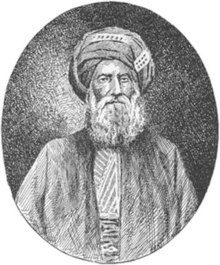David Sassoon
| David Sassoon | |
|---|---|
 |
|
| Born | October 1792 Baghdad, Baghdad Eyalet, Ottoman Empire |
| Died | November 7, 1864 (aged 72) Poona, British India |
| Occupation | Treasurer of Baghdad, businessman |
David Sassoon (October 1792 – November 7, 1864) was the treasurer of Baghdad between 1817 and 1829. He became the leader of the Jewish community in Bombay (now Mumbai) after Baghdadi Jews emigrated there. He was a leading trader of cotton and opium in China.
Sassoon was born in Baghdad, where his father, Saleh Sassoon (1750-1830), was a wealthy businessman, chief treasurer to the pashas (the governors of Baghdad) from 1781 to 1817, and president (Nasi) of the city's Jewish community.
The family were Iraqi Jews. His mother was Amam Gabbai. After a traditional education in the Hebrew language, Sassoon married Hannah in 1818. They had two sons and two daughters before she died in 1826. Two years later he married Farha Hyeem (who was born in 1812 and died in 1886). The pair had six sons and three daughters.
Following increasing persecution of Baghdad's Jews by Dawud Pasha, the family moved to Bombay via Persia. Sassoon was in business in Bombay no later than 1832, originally acting as a middleman between British textile firms and Gulf commodity merchants, subsequently investing in valuable harbour properties. His major competitors were Parsis, whose profits were built on their domination of the Sino-Indian opium trade since the 1820s.
When the Treaty of Nanking opened up China to British traders, Sassoon developed his textile operations into a profitable triangular trade: Indian yarn and opium were carried to China, where he bought goods which were sold in Britain, from where he obtained Lancashire cotton products. He sent his son Elias David Sassoon to Canton, where he was the first Jewish trader (with 24 Parsi rivals). In 1845, David Sassoon & Co. opened an office in what would soon become Shanghai's British concession, and it became the firm's second hub of operations.
...
Wikipedia
